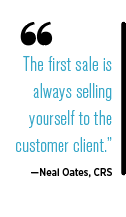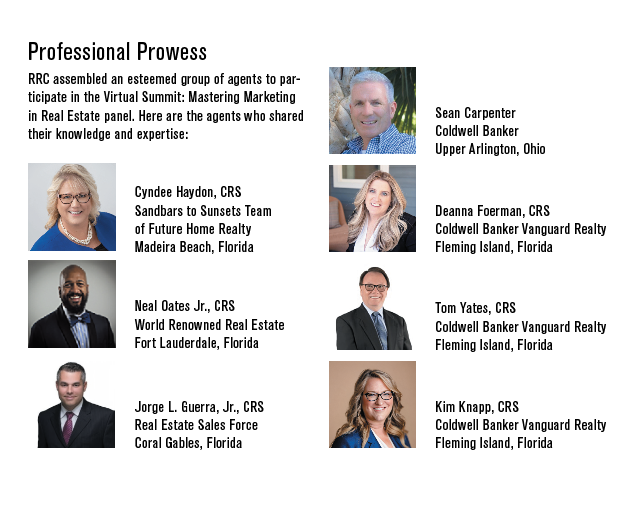If you missed RRC’s 2024 Virtual Summit: Mastering Marketing in Real Estate, take some time to dive in to get some top-level advice on ways to enhance your business. Longtime CRS Certified Instructor Kim Knapp, broker manager at Coldwell Banker Vanguard in Fleming Island, Florida, moderated the panel, which included CRSs from around the country.
Knapp guided the panelists in discussions on three topic areas: the power of niche marketing, creating raving fans during the sale and solidifying your connection after the sale.
Work the niche
“Niche marketing allows you to work the caliber and quality of people you want to work with, well within the fair housing requirements,” says Neal Oates, CRS. By specializing in one area of interest—which for Oates is single-family waterfront homes—an agent can exercise their passion all in a day’s work. When you work in your niche, Oates says, you have an easy “first sell.”
 “The first sale is always selling yourself to the customer client, so I don’t have to sell as hard during that initial consultation, whether it’s a lister or a buyer, because they can tell how much I like their type of home,” Oates says.
“The first sale is always selling yourself to the customer client, so I don’t have to sell as hard during that initial consultation, whether it’s a lister or a buyer, because they can tell how much I like their type of home,” Oates says.
When it comes to mastering that niche, Oates explains that one can accomplish that relatively quickly—in about 18 months—with three key goals: know your audience, don’t deviate from the plan and commit to being consistent for 18 months. “You can get good at identifying who your ideal client is and become an expert in your niche in a matter of weeks, as opposed to spending years trying to learn everything about everything,” he says. You want to stay with it long enough to see your expertise come to fruition.
Regularly overdelivering
Knapp herself was able to weigh in on how to impress clients so much that they wouldn’t think of using another agent. “Starting with the assumption that you are already going to do everything that’s expected,” explains Knapp, “you can create a raving fan during the sale by having a mindset of doing things above and beyond, on purpose, throughout the transaction.
“That includes anticipating what a person might need. For example, let’s say you’re with a client whose child needed special services from the public school,” she continues. “You say, ‘Seeing you are interested in this property, here’s the contact person at the elementary school, if you would like to set up a time to talk with them about your concerns or needs.’ It proves you’re listening to them, and you’ve just made something easy for them. That can make all the difference.”
Knapp also points out that this kind of attentiveness doesn’t have to add a lot to your workload. “It’s not about being 50% better at that one thing. If you can practice continually being 1% better at a lot of things over time, that effort compounds,” she says. “If you get 1% better at what you do for your customers during the transaction over the next 30 days, then 1% better the next month and the month after that, soon you’ll be indispensable.”
Lock them in
And once you’re indispensable, you’ll have a chance to solidify that connection and be someone’s go-to professional for life. “You would rather have someone say, ‘Do you know my real estate agent?’ instead of ‘This person sold me my house,’” Knapp explains. “When you follow up after a sale, and you stay in that relationship, then you remain their agent, no matter how many other people they meet in real estate.”

These were just a few highlights of the business insights offered during the Summit. Summit registrants can revisit the discussion in their RRC Learning Portal at education.crs.com/learn.
Photo: iStock PayPau








